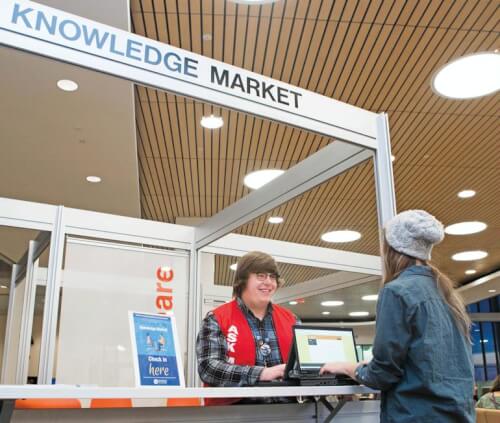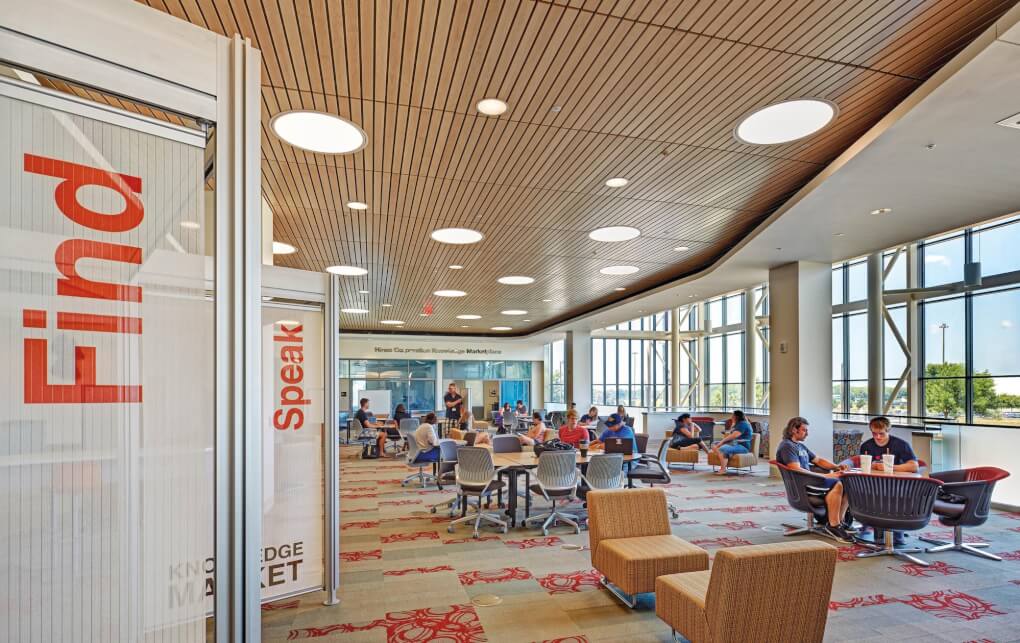First-year student Nicholas Moran was in the library working on a research paper for his honors college course and got stuck.
His topic: Carolingian Minuscule. Huh? It’s a calligraphic script developed in Europe and used during the Roman Empire so the Latin alphabet could be recognized from region to region.
Moran, who is majoring in multimedia journalism and communications, said he had trouble navigating the library’s website to find more sources. So, he walked over to the Knowledge Market in the Mary Idema Pew Library for a quick walk-in appointment with a student consultant.
The Knowledge Market is staffed with trained students who are ready to help their peers with papers, research projects and presentations. Think of the consultants as market vendors in a traditional market, only they are ready to offer free consultations in research, writing, data analysis and speech.
Moran said his consultant wasn’t immediately familiar with ancient European fonts but certainly pointed him in the right direction. “She showed me the basics of researching on the library’s website, then got me in contact with other, more in-depth tools,” said Moran, a native of Glenview, Illinois. “She also pointed me toward the archives we have on campus, then asked other Knowledge Market workers for clarity.”
Moran left a satisfied customer, one of many in the five years the Knowledge Market has been open. When the market opened in 2013, it was, and remains, unique among academic libraries. Former University Libraries Dean Lee Van Orsdel laid the groundwork for the Knowledge Market when the Pew Library opened that year.

Peer communication
Jennifer Torreano, research consultant manager for University Libraries, said peer-to-peer consulting offers many benefits, one of which is of particular importance to students.
“Peer consultations provide an opportunity to work through ideas and processes alongside someone who is not grading their work,” Torreano said. “Students can ask questions, think through concepts, and try different approaches with a peer trained to guide them.”
The market’s consultants are trained by Knowledge Market partner entities: University Libraries, Fred Meijer Center for Writing and Michigan Authors, Speech Lab, and Data Inquiry Lab. Knowledge Markets are located in the Mary Idema Pew Library on the Allendale Campus and the Steelcase Library on the Pew Grand Rapids Campus. The Writing Center and Speech Lab also have other campus locations.
Patrick Johnson, director of the Writing Center, said peer support is very important during the writing process.
“Writers need readers to make sure they are communicating their ideas,” Johnson said. “The Writing Center provides a free, open-door service to any writer at Grand Valley where anyone can receive focused feedback to assist with revision.”
“It was important for students in STEM fields to know I was not a tutor but I could help them find the resources they need.”
KAHLER SWEENEY, FORMER RESEARCH LEAD CONSULTANT
The Knowledge Market follows student study patterns and is open into the late evenings with extended hours during exam weeks. It’s a popular place. More than 6,000 students visited the markets in 2017-2018 for consultations. At the Writing Center locations, students sought 11,350 consultations, and at Speech Lab locations, 2,206 consultations.
Dan Ziegenfelder was not shy about asking for help. Ziegenfelder, from Troy, graduated in April with a bachelor’s degree in advertising and public relations. He called the market one of his favorite resources on campus.
“I enjoyed consultations because it was great to talk things out with someone and it was easy to bring up questions that I might not ask a professor,” he said. “Having a consultation with a student my age made it easy for them to relate to me and help me understand things better.”
Consultants are trained in their expert area (writing, research, presentation, data inquiry) and cross-trained to know the resources of the other content areas. Mostly, according to Writing Center coordinator Melanie Rabine, they’re trained to be active listeners. Rabine said consultants are trained to guide a student from one level of work to the next, not do the work for them.
Usually it’s the student seeking the consultation who knows more about the subject matter.
Kahler Sweeney worked as a research lead consultant after spending a year as a consultant. Sweeney, who graduated with a bachelor’s degree in political science, and public and nonprofit administration, said consultants stress to students that they offer interdisciplinary services.
“We often tell students that they are the experts, as students are often better trained in the subject area than the consultant they are working with,” Sweeney said. “It was important for students in STEM fields to know I was not a tutor but I could help them find the resources they need.”
It’s the same for the Data Inquiry Lab consultants, who are graduate students. Whitt Kilburn, associate professor of political science and DIL faculty fellow, said consultants are trained to help students apply what they have learned about applied statistics to their projects. For example, students in a political science course sought help analyzing the World Bank’s economic development indicators, and biomedical science students sought consultations during a lab project involving crayfish.
Two-way street
It’s not only students who seek consultations who benefit. In addition to polishing their own professional development skills, lead consultants assist with hiring and training new consultants and many have given presentations at national conferences.
The Writing Center regularly sends a large group of consultants to the Michigan Writing Centers Association conference and other conferences. Johnson said sending consultants to a conference reflects the center’s mission of professional and academic growth.
Speech Lab consultants and Carl Brown, director of the lab, won top honors in April at the National Association of Communication Centers annual conference. The lab is one of 16 communications centers in the country with a nationally certified training program.
Skye Gregory-Hatch won a graduate student award for her paper exploring best practices for reducing speech anxiety. Jeannine Lane and Jane Ulrey won best undergraduate paper for their research that examined the development of relationships among staff members at communication centers. Brown, Johnson and Torreano, along with three other colleagues, earned best faculty paper for their research examining the impact of consultants in the classroom.
“I am thrilled about these accomplishments,” Brown said. “When I was hired at Grand Valley, Fred Antczak, College of Liberal Arts and Sciences dean, said he wanted the Speech Lab to be a site for high-impact research. I’m happy to say we are just that and the nation has taken notice.”








